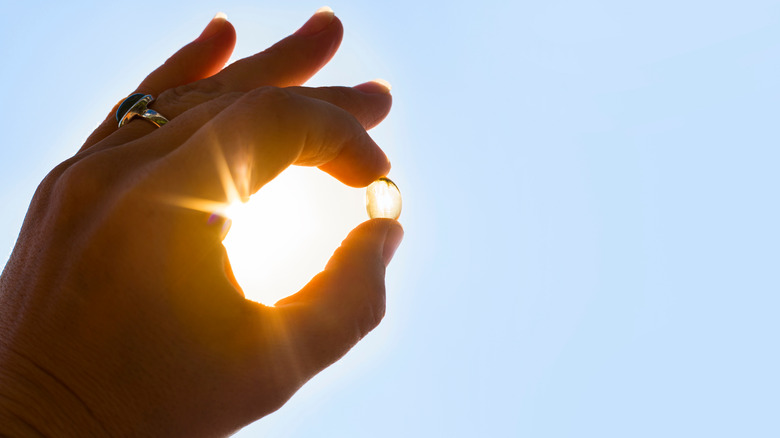This Is How Long It Takes For Vitamin D To Start Working
Soaking up the summer sun at the beach has more advantages than just having fun surfing the waves and relieving the stresses of life through relaxation. As reported by Healthline, our skin produces vitamin D from cholesterol whenever it makes contact with sunlight. Additionally, salmon, canned tuna, egg yolks, and sardines are among the few foods that contain substantial amounts of vitamin D. However, in order to receive the amount of vitamin D that our bodies need, Healthline explains that we would have to eat these foods almost every day. Because of this, spending adequate time in the sun and taking supplements are some of the best ways to reap the natural benefits that vitamin D provides.
Vitamin D is such an essential nutrient to the human body that a deficiency in it can contribute to health problems. According to MedlinePlus, vitamin D deficiency negatively impacts bone density, which can lead to osteoporosis and broken bones. Furthermore, researchers believe there may also be connections to other diseases such as high blood pressure, diabetes, cancer, and autoimmune disorders, yet further research is needed.
Some individuals who do not receive enough sunlight may take daily supplements to increase their levels of vitamin D. If you are currently taking supplements to boost the amount of vitamin D in your body, you may wonder how long it takes for this process to occur. Luckily, medical experts can provide some insight to better understand the answer to this question.
How long it takes for Vitamin D to work
Discussing your symptoms with your doctor can help if you struggle with insufficient vitamin D levels. Your doctor may recommend that you take a multivitamin, or higher doses of vitamin D if your levels are unusually low (per Livestrong). When vitamin D kicks in, individuals may notice improvements in their deficiency symptoms which may include tiredness, weakness, or depression.
As for how long it takes the supplements to work, the answer may be different depending on the person, and it can take longer depending on how depleted a person is. Livestrong reports that for each 40 IU consumed, it is believed that vitamin D levels usually rise by 1 ng/mL after a few weeks. However, individuals who are very deficient in vitamin D may not notice a significant increase in their levels until up to two to three months, states Drugs.com. Molly Ropte, doctor of osteopathic medicine, shares with UnityPoint Health that many individuals who take over-the-counter vitamin D supplements can notice an improvement within three to four months. Having your vitamin D levels checked by your doctor every two to three months is critical if you struggle with vitamin D deficiency or suspect you may have it.


